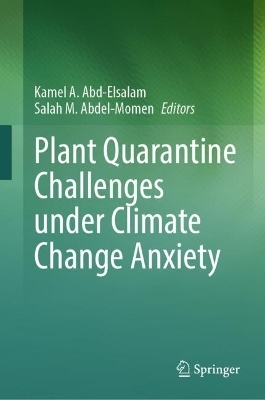
Plant Quarantine Challenges under Climate Change Anxiety
Springer International Publishing (Verlag)
978-3-031-56010-1 (ISBN)
The effects of climate change on food safety and plant health represent a relatively new area of study. However, evidence from recent studies is clear: climate change contributes to increased and new food safety & plant health risks as one of several global change factors. This volume analyzes the scientific understanding of the relationship between climate change, food safety, plant pests, plant diseases, and trade. It identifies and discusses four key areas for future policy consideration: risk assessment, SPS capacity in developing countries, climate change resilience, and basic research challenges. We must effectively communicate the impacts of climate change on plant health and build the capacity of national plant protection organizations. More importantly, we need to mobilize resources that will help build stronger national phytosanitary systems that can prevent the spread of plant pests, thereby protecting our food sources and environment, and facilitating safe trade.
The present volume is an asset for plant quarantine personnel working in the field, agricultural university students, plant health workers, farmers doing agriculture, plant & seed traders, and all those who use agricultural produce and products. The book is a useful resource for students and professional plant pathologists, entomologists, and plant breeders because it summarizes current knowledge and suggests new research directions. It is also suitable for ecologists & researchers working on crop protection, climate change, and pest control.
Kamel A. Abd-Elsalam, Ph.D. is currently a Research Professor at the Plant Pathology Research Institute, Agricultural Research Center, Giza, Egypt. His research interests include developing, improving, and deploying plant biosecurity diagnostic tools, understanding & exploiting fungal pathogen genomes, and developing eco-friendly hybrid nanomaterials for controlling toxicogenic fungi, plant diseases and Agroecosystems applications. He has published extensively in international peer reviewed journals including Fungal Biology and International Journal of Biological Macromolecules. He served as a Guest Editor for the Journal of Fungi, Plants, and Microorganisms, as a Review Editor for Frontiers in Genomic Assay Technology, and refereed for several reputed journals. In 2014, he was awarded the Federation of Arab Scientific Study Councils Prize for excellent scientific research in biotechnology (first ranking, fungal genomics). In addition, according to Stanford University's worldwide database rating in 2021, Kamel A. Abd-Elsalam has been listed among the top 2% of the world's most influential scientists by Stanford University and Elsevier. Dr. Kamel earned his Ph.D. in Molecular Plant Pathology from Christian Alberchts University of Kiel (Germany) and Suez Canal University (Egypt), and in 2008 he was awarded a postdoctoral fellowship from the same institution. Dr. Kamel was a visiting associate professor at Mae Fah Luang University in Thailand, the Institute of Microbiology at TUM in Germany, the Laboratory of Phytopathology at Wageningen University in the Netherlands, and the Plant Protection Department at Sassari University in Italy.
Preface.- Chapter. 1. Guarding the Greenery: Plant Health and Quarantine under climate change conditions.- Chapter. 2. Agricultural Security to ensure the food safety under the Plant Protection.- Chapter. 3. Plant Pathogen Mitigation and Adaptation to Climate Change.- Chapter. 4. Plant Health Check: Emerging Methods for Disease Detection.- Chapter. 5. Quarantine of Germplasm: Safeguarding Genetic Resources through in vitro Tissue Culture.- Chapter. 6. Effects of Climate Change on Plant Pests.- Chapter. 7. Effects of Climate Change on Plant Diseases.- Chapter. 8. Effects of climate change on bacterial and viral pathogens.- Chapter. 9. Climate change impact on Phyto-Pathogen emergence: Artificial intelligence (AI) approach.- Chapter. 10. Climate Change poses threat to Helicoverpa zea Boddie (Lepidoptera: Noctuidae).- Chapter. 11. Does climate change heighten the risk of Xylella fastidiosa infection?.- Chapter. 12. Analyzing pest risk in the context of climate change.- Chapter. 13. Climate-smart IPM.- Chapter. 14. Management approaches for biological control of invasive species.- Chapter. 15. Preharvest methods for controlling pathogen infection in fruits.- Chapter. 16. New Insights of Nanofungicides for Plant Disease Management.- Chapter. 17. Challenges in plant breeding: A review.
| Erscheinungsdatum | 17.05.2024 |
|---|---|
| Zusatzinfo | XIII, 559 p. 76 illus. in color. |
| Verlagsort | Cham |
| Sprache | englisch |
| Maße | 155 x 235 mm |
| Themenwelt | Naturwissenschaften ► Biologie ► Botanik |
| Schlagworte | Agriculture • Pest • phytosanitary • Plant diseases • Plant Protection |
| ISBN-10 | 3-031-56010-8 / 3031560108 |
| ISBN-13 | 978-3-031-56010-1 / 9783031560101 |
| Zustand | Neuware |
| Informationen gemäß Produktsicherheitsverordnung (GPSR) | |
| Haben Sie eine Frage zum Produkt? |
aus dem Bereich


